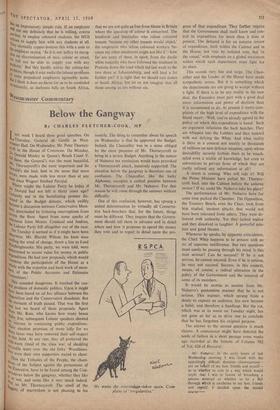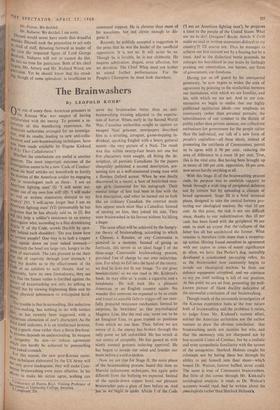W estmanster Commentary
Below the Gangway
By CHARLES FLETCHER-COOK, MP
LAST week I heard three great speeches. On Thursday, General de Gaulle in West- inster Hall. On Wednesday, Mr. Peter Thorney- ir.ult in the House of Commons. On Monday, 01,r Oswald Mosley in Queen's Bench Court V. kAt these, the General's was the most beautiful, Thorneycroft's the most important and Sir buswald's the best, best in the sense that more rrieks, were made with less straw than at any InLe since Wagner finished Parsifai. .Where might the Labour Party be today if Oswald had not left it thirty years ago? iertainly not in the humiliating posture dis- cblesed in the Budget debates, which swiftly beecame a discussion between Conservative Mem- a rs, Punctuated by irritating interruptions from ecross the floor. Apart from some sparks of t,elevance from Messrs. Crosland and Jenkins, Ile Labour Party fell altogether out of the race.
Tuesday it seemed as if it might have been suthervvise. Mr. Harold Wilson, his keen nose 1.,11%g the wind of change, threw a line to Lord Mehingbrooke. His party, we were told, were eetermined to secure value for money in public ,‘Peuditure. He had new proposals, which would we°Mbine the participation of the House as a bht)ie with the expertise and hard work of mem- cers of the Public Accounts and Estimates Pflurtittees; tfhis sounded dangerous. It touched the cen- i'lal Problem of domestic politics. Upon it might (;Ive been based an ad hoc alliance between the tIPPosition and the Conservative dissidents. But 4e moment of truth passed. That was the first irld last we heard of these proposals. Apart tit°1-11 Mr. Ross, who knows how many beans 1) ake five, subsequent Labour speakers showed .1° interest in containing public expenditure. rtheir election promises of more lolly for no iti/re taxes may have removed their self-respect Iv this field. At any rate, they all preferred the trell-worn ritual of the class war, of shedding Nueodile tears over the old folks' Woodbines. °t even their own supporters stayed to cheer. piThus the Tribunes of the People, the cham- tt°11s of the Subject against the pretensions of eeExecutive, have to be found among the Con- it rvatives below the gangway, whether they like 14 Or not, and some like it very much indeed. 1,43t so Mr. Thorneycroft. The smell of the
ots of martyrdom is not pleasing to his
nostrils. The thing to remember about his speech on Wednesday is that he approved the Budget. Indeed, the Chancellor was in a sense obliged by the mere presence of Mr. Thorneycroft to bring in a severe Budget. Anything in the nature of Nabarro tax remissions would have provoked a Thorneycroft attack, massively supported. The situation below the gangway is therefore one of confusion. The Chancellor, like the lucky Alphonse, occupies a central position between Mr. Thorneycroft and Mr. Nabarro. For that reason he will come through the summer without difficulty.
Out of this confusion, however, has sprung a united determination by virtually all Conserva- tive back-benchers that, for the future, things must be different. They require that the Govern- ment should tell them in advance and in detail where and how it proposes to spend the money they vote and to report in detail upon the pro-
'He wants the referendum taken again. Com- plains of "irregularities."'
gress of that expenditure. They further require that the Government shall itself know and con- trol its expenditure far more than it does at present. The demand is for an autumn review of expenditure, both within the Cabinet and in the House, not vote by isolated vote, but 'in the round,' with emphasis on a global maximum within which each department must fight for its share.
This sounds very fine and large. 'I-he Chan- cellor and the Leader of the House have made sympathetic noises. But it is something which the departments are not going to accept without a fight. If there is to be any reality in the new deal, the Executive must part with a good deal more information and power of decision than it is accustomed to do. At present it meets com- plaints of the high level of expenditure with the bland retort: 'Well, you've already agreed to the policy on which this expenditure is based.' Such an argument infuriates the back benches. They are whipped into the Lobbies and then taunted with not defying the Whip. And what reality is there in a consent not merely to thousands of millions on new defence weapons, upon whose desirability security forbids them to be vouch- safed even a trickle of knowledge, but even to subventions to private firms of which they are curtly refused any information at all?
A storth is coming. Who will Tide it? Will the Prime Minister have pulled Mr. Thorney- croft back into the Cabinet before the autumn review? If so, could Mr. Nabarro take his place?
The performances of Mr. Nabarro have for some time packed the Chamber. The Opposition, the Treasury Bench, even the Chair, took from him studied, insolent attacks that would not have been tolerated from others. They were de- livered with authority. Yet they lacked malice and they dissolved in laughter. A powerful mix- ture and good theatre.
Whenever he speaks, by apparent coincidence, the Chief Whip happens to be present with an air of supreme indifference. But two questions must surely be passing through his mind. Is this man serious? Can he succeed? If he is not serious, he cannot succeed. Even if he is serious, he may not succeed. Success, in this context, means, of course, a radical alteration in the policy of the Government and the removal of some of its members.
It would be unwise to assume from Mr. Nabarro's pantomime manner that he is not serious. This (runner, which sprang from a desire to capture an audience, has now become a habit, and therefore a handicap. But the rot, which was at its worst on Tuesday night, has not gone so far as to drive one to conclude that he has forgotten his original purpose.
The answer to the second question is much clearer. A connoisseur might have detected the seeds of failure in a short passage some weeks ago recorded at the bottom of Column 982 of Vol. 620 of Hansard: Mr. Nalsurto: In the early hours of last Wednesday Inorning I was faced with the appallingly difficult decision--(Interruption)-- yes on behalf of my him friends and myself— as to whether to vote in a way which would imply that I was in favour of breaching a solemn contract or whether to let a Bill through which is anathema to my hon. friends and myself. I decided upon the second course-
Mr. Peyton: We decided.
Mr. Nabarro: We decided. I am sorry.
ptsraeli would never have made that dreadful mistake. Disraeli took the precaution to act only as chief of staff, thrusting forward as leader of t...he cave the respected figure of Lord George uentinck. Nabarro will not or cannot do this. Ile has no time for patricians. Both of his chief targets, Mr. Amory and Mr. Richard Wood, are Patricians. Yet he should know that his stand- Ing• though of some splendour, is insufficient to
command support. He is cleverer than most of his associates, but not clever enough to dis- guise it. Recently he publicly accepted a suggestion in the press that he was the leader of the unofficial opposition. It is not so. It will never be so. Though he is lovable, he is not clubbable. He inspires admiration, disgust, even affection, but no devotion. The Chief Whip need not bother to attend further performances. For the People's Champion he must look elsewhere.



































 Previous page
Previous page